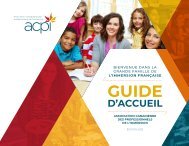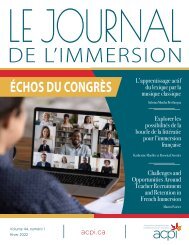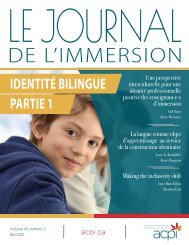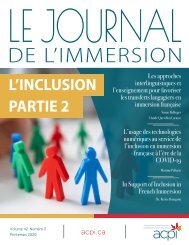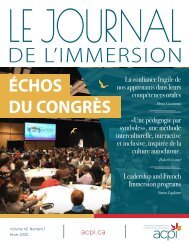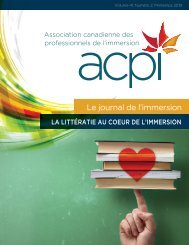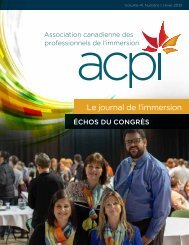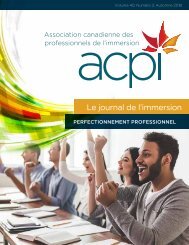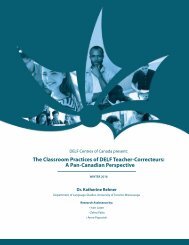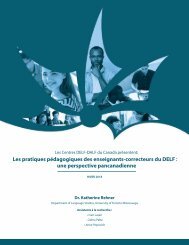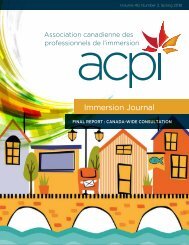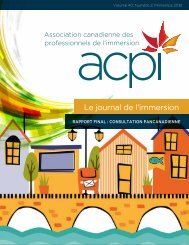Le journal de l’immersion - L’INCLUSION - PARTIE 1
- No tags were found...
Create successful ePaper yourself
Turn your PDF publications into a flip-book with our unique Google optimized e-Paper software.
INCLUSION<br />
<strong>de</strong>s troubles d’apprentissage, tout en créant <strong>de</strong>s outils et<br />
interventions pédagogiques d’alphabétisation en français<br />
fondés sur les étu<strong>de</strong>s disponibles.<br />
En abordant la littératie d’une façon plus intensive,<br />
structurée, globale et explicite, pendant la maternelle et<br />
la première année, les interventions les plus appropriées<br />
peuvent maintenant être mises en œuvre sans tar<strong>de</strong>r à un<br />
moment où elles peuvent avoir les plus gran<strong>de</strong>s retombées<br />
pour les élèves à risque.<br />
Non seulement cette pratique renseigne le personnel<br />
enseignant beaucoup plus tôt, elle permet également <strong>de</strong><br />
générer la documentation nécessaire pour mieux façonner<br />
la réponse à l’intervention (RAI) à plusieurs niveaux <strong>de</strong><br />
la pyrami<strong>de</strong>. Cette approche systématique ainsi que la<br />
documentation générée durant le cheminement <strong>de</strong> l’élève<br />
peuvent aussi appuyer les <strong>de</strong>man<strong>de</strong>s pour services et<br />
évaluations spécialisés et faciliter la détermination d’un<br />
trouble d’apprentissage ou autres défis scolaires plus<br />
efficacement.<br />
Prochaines étapes<br />
L’équipe recueillera diverses formes <strong>de</strong> preuves <strong>de</strong><br />
l’apprentissage <strong>de</strong>s élèves, ainsi que les réactions <strong>de</strong>s élèves<br />
et <strong>de</strong>s enseignants, afin d’orienter les pratiques actuelles,<br />
la planification et la recherche dans le domaine. Nous<br />
espérons que cette nouvelle approche précoce, globale,<br />
systématique et inclusive nous permettra <strong>de</strong> constater une<br />
amélioration du ren<strong>de</strong>ment <strong>de</strong>s élèves et <strong>de</strong> combler l’écart<br />
<strong>de</strong> ren<strong>de</strong>ment plus tôt, en particulier pour les élèves dont les<br />
résultats <strong>de</strong> dépistage étaient les plus préoccupants. Nous<br />
croyons que cette démarche a le potentiel non seulement<br />
d’ai<strong>de</strong>r les apprenants ayant le plus <strong>de</strong> difficulté dans un<br />
environnement inclusif, mais également <strong>de</strong> démontrer que<br />
les élèves susceptibles <strong>de</strong> vivre un trouble d’apprentissage<br />
en lecture ont leur place et peuvent être soutenus <strong>de</strong> manière<br />
appropriée dans les programmes d’immersion française.<br />
Références<br />
Bissonnette, S., M. Richard, C. Gauthier et C. Bouchard (2010). Quelles sont les stratégies d’enseignement efficaces favorisant les apprentissages<br />
fondamentaux auprès <strong>de</strong>s élèves en difficulté <strong>de</strong> niveau élémentaire? Résultats d’une mégaanalyse. Revue <strong>de</strong> recherche appliquée sur l’apprentissage, 3<br />
(1), 1-35.<br />
Dickinson, D. K., A. McCabe et M. J. Essex (2006). A window of opportunity we must open to all: The case for preschool with high-quality support for<br />
language and literacy. Dans S. B. Neuman et D. K. Dickinson (dir.), Handbook of early literacy research (Volume 2, p. 11–28). New York : Guilford .<br />
Erdos, C., F. Genesee, R. Savage et C. A. Haigh (2010). Individual differences in second language reading outcomes. International Journal of<br />
Bilingualism 15(1), 3–25.<br />
Gauthier, C., S. Bissonnette, M. Richard et M. Castonguay (2013). Enseignement explicite et réussite <strong>de</strong>s élèves. La gestion <strong>de</strong>s apprentissages. Montréal,<br />
Canada : Éditions du Renouveau Pédagogique Inc.<br />
Graham, S. (2009-2010). Want to improve children’s writing? Don’t neglect their handwriting. American Educator, Winter, 20-27. Repéré à http://www.<br />
aft.org/pdfs/americaneducator/winter2009/graham.pdf<br />
Graham, S. et K. Harris. (2005). Writing better: Effective strategies for teaching stu<strong>de</strong>nts with learning difficulties. Baltimore, MD: Brookes Publishing<br />
Company.<br />
Lyon, G. R. (1995). Research initiatives in learning disabilities: Contributions from scientists supported by the National Institute of Child Health and<br />
Human Development. Journal of Child Neurology , 10 (Suppl. 1), S120–S126.<br />
Mather, N. (1992) Whole language reading instruction for stu<strong>de</strong>nts with learning disabilities; caught in the crossfire. <strong>Le</strong>arning Disabilities Research and<br />
Practice, 7, 87-95<br />
National Early Literacy Panel. (2008). Developing early literacy: Report of the National Early Literacy Panel. Executive Summary. Washington, DC:<br />
National Institute for Literacy.<br />
National Reading Panel (2000). Teaching children to read: An evi<strong>de</strong>nce-based assessment of the scientific research literature on reading and its<br />
implications for reading instruction. Washington , DC : National Institute of Child Health and Human Development.<br />
National Research Council (2001). Eager to learn: Educating our preschoolers. Washington , DC : The National Aca<strong>de</strong>mies Press.<br />
Scheffel, D. L., J. C. Shaw et R. Shaw (2008). The efficacy of a supplemental multisensory reading program for first-gra<strong>de</strong> stu<strong>de</strong>nts. Journal of Reading<br />
Improvement, 45(3), 139-152.<br />
Snow, C. E., M. S. Burns et P. Griffin (1998). Preventing reading difficulties in young children. Washington, DC : The National Aca<strong>de</strong>mies Press. Repéré<br />
à http://www.nap.edu<br />
Wanzek, J., S. Vaughn, J. Wexler, E. A. Swanson, M. Edmonds et A. H. Kim (2006). A synthesis of spelling and reading interventions and their effects<br />
on the spelling outcomes of stu<strong>de</strong>nts with LD. Journal of <strong>Le</strong>arning Disabilities, 39(6), 528-543.<br />
Wise, N. et X. Chen (2009). Early i<strong>de</strong>ntification and intervention for at-risk rea<strong>de</strong>rs in French immersion. What works? Research into practice, 18.<br />
Repéré à http://www.edu.gov.on.ca/eng/literacynumeracy/inspire/research/At_Risk_Rea<strong>de</strong>rs_en.pdf<br />
25<br />
Vol. 41, No. 3, Automne 2019



